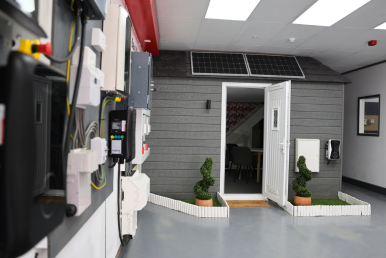By Damian Ciesielski
Powering the UK’s Net-Zero Future: Solving the Green Skills Crisis
As the UK races toward its target of net-zero greenhouse gas emissions by 2050, the pressure is on, not just for policy or infrastructure, but for people. Behind every smart meter, heat pump, EV charger, and green energy project is a skilled professional making it happen. And right now, we do not have nearly enough of them.
The Workforce Behind Net Zero
To meet its climate targets, the UK will need to fill an estimated 400,000 energy-related jobs by 2050, according to the National Grid’s “Building the Net Zero Energy Workforce” report. These jobs span a broad range, including renewable energy technicians, data analysts, and customer service engineers trained to deploy new low-carbon technologies in British homes.
At the same time, the government is targeting:
A 68% reduction in emissions by 2030, compared to 1990 levels
Net-zero by 2050, effectively eliminating the UK's contribution to global greenhouse gas emissions
This transition will require not just more workers, but the right workers with the necessary skills, behaviours, and adaptability to succeed in a constantly evolving environment.
The Challenge: More Than Just Skills
The solution is not simply about filling vacancies. It is about creating a workforce that is:
Technically capable of delivering new green technologies
Geographically available where demand is strongest
Customer-focused to meet rising service expectations
Culturally aligned with a safety-first, performance-oriented sector
Technical qualifications are essential, but they are no longer sufficient on their own. In many roles, mindset, soft skills, and behavioural competencies are equally important.
Behaviour Science: Better Performance
At Ganymede, our workforce model is built to meet the demands of the energy transition. We combine proactive sourcing, tailored training, and full lifecycle support to ensure consistent delivery across all projects. One of our key differentiators is our use of behavioural science to drive better performance, engagement, and retention.
Behavioural Science in Action
We apply behavioural science at every stage of our process:
Recruitment: We assess motivation, emotional intelligence, and alignment with company values, not just qualifications.
Assessment: Our screening tools are designed to predict job performance based on behavioural traits proven to correlate with success.
Training: We focus on customer empathy, adaptability, and resilience, in addition to technical capabilities.
Management: Our regional field teams apply behavioural insights to coach operatives, improve compliance, and foster a performance-driven culture.
This approach helps ensure strong job matches, higher productivity, and more consistent service quality for our clients.
Built for the Energy Transition
Our clients benefit from:
Faster mobilisation for major national projects
Higher levels of customer satisfaction
Lower attrition and retraining costs
Consistent service delivery, even across large and complex operations
We continuously invest in training, workforce analytics, and service refinement to help our partners succeed in a rapidly changing energy market.

Conclusion
The success of the UK’s net-zero strategy depends on more than just innovation and infrastructure. It relies on a skilled, scalable, and resilient workforce. At Ganymede, we are focused not just on filling roles, but on building a workforce that is trained, customer-ready, and equipped to lead the UK toward a greener future.
We are ready to help you power the next chapter of the energy transition.